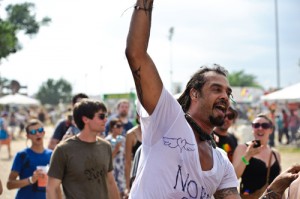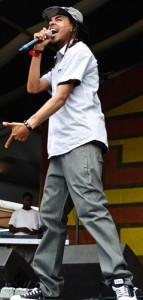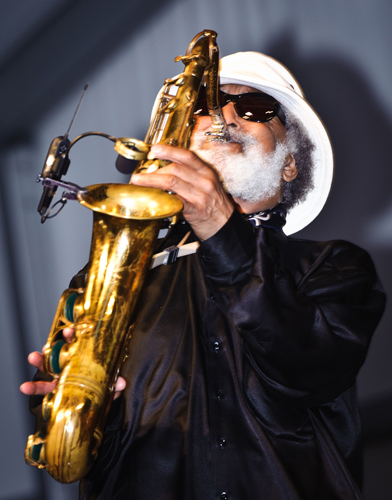People had too much fun Saturday night or they had little excitement for Sunday’s lineup because the day’s crowd took it’s time appearing. To the day:
– The Playing for Change band made the argument that everything is world music—a good point—and it did so with a lot of warmth and soul. Still, Grandpa Elliot struck a needed silly note when he did what he could to join the front-line singers in a dance, but doing so while sitting down and wearing his trademark overalls.
– The Lost Bayou Ramblers continue to develop a rock-influenced version of Cajun music, first with heavier drums, and on Sunday with guitar distortion and bowed bass fiddle on a tune that Louis Michot explained was a Cajun version of “zef.” Each step seems to suggest another interesting step for the band as they explore how to be contemporary and Cajun, and though they don’t all work—recordings I’ve heard of some of these tracks don’t capture where they’re at yet—the journey rewards attention.
– More Gospel anxiety: One of my finest moments in the Gospel Tent came courtesy of the Mt. Hermon Baptist Church Mass Choir, but I suspect I heard something different from the music they were making. For me, a song titled “I’ve Never Seen the Righteous Forsaken” became gospel house, complete with a thumping, relentless disco bass, a percussion break, and vocals from the choir that seemed to chop themselves into a sample as they sang “I’ve never seen the…” over and over again. But were they going for a club sound? Admittedly, they had a strong pop sensibility and celebrated love (without being specific what kind) by singing “Love Train” and Foreigner’s “I Want to Know What Love Is,” but neither of those suggests much awareness of dance music from clubland from the last 20 years.
An equally curious moment came when the choir sang “Let it Be,” and while they did so, the leader vamped on the phrase “Leave it alone.” How did that relate to Jesus, God and faith? The phrases could be synonymous, but the Beatles version seems to be more about acceptance than refusal. Was it an anti-drug song, assuming listeners would infer what “it” is? That ambiguity made me wonder if there’s something to my gospel house theory.
– Grousing time: How bad is the set-up for the Blues Tent, which is often hard to get into and which has fans as defensive of their space as any tarp dweller on the Acura lawn? And have there been more soundboard fails at one Jazz Fest? I suspect the grease fire that was the first 10 minutes of Ms. Lauryn Hill’s time onstage had at least something to do with the band itself, but after Dave Malone introduced Mark Mullins as “the sixth Rad,” Mullins stepped up to the mic, blew a solo and none of us heard a thing. Since he was on the big screen as well, it was almost impossible to miss that Mullins was in a prominent music-making position and should be heard. Other fails include the high, swarm of bees-like distortion that accompanied Lillian Boutte when she sang with Tom McDermott during the James Booker tribute Thursday, and Stanton Moore’s cannon-like rack toms during Galactic’s set. They were louder than his snare drum and engulfed anything played or sung by anyone else onstage when he went to them. I’m sure the front-of-house job is harder than any of us know, but Jazz Fest is the city’s biggest stage so we have to do better.
– Arcade Fire stories just keep coming. I heard they hung around town and went to see the Klezmer All-Stars one night, and when they wanted to play basketball, they went to the courts at the corner of Napoleon and Magazine (one good thing about being a big band: you can always get together a good 3-on-3 or 4-on-4 game), and yesterday, they showed up for a workshop in the Haiti Pavilion with RAM Haiti.
– Here’s a post-Jazz Fest game: guess how many times Trombone Shorty appeared on a Jazz Fest stage. I don’t know the answer (yet!), but the last one I saw was when he joined Kid Rock to breathe some fire into “All Summer Long.” Yesterday I commented on the excitement he generates in a solo, and part of it is because he works in short, digestible chunks. A longer solo is really a series of shorter solos stacked on top of each other, and each is designed to bring energy. A second post-Fest game: Who wants to bet against Shorty moving in to the Sunday Gentilly slot that the Radiators just abandoned?







